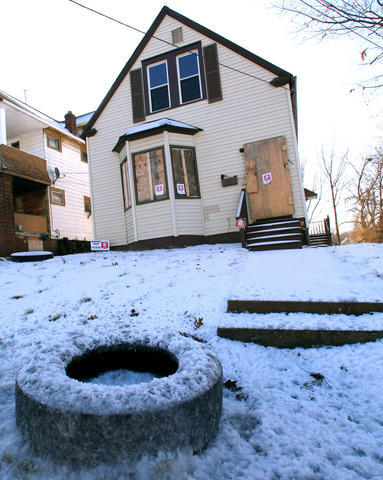Hit by the US' mortgage crisis, Cleveland, Ohio, has launched a legal battle against major Wall Street banks it blames for the devastation of its housing market.
Cleveland Mayor Frank Jackson has accused a group of 21 big banks and financial firms of triggering local housing woes through the marketing of subprime home loans.
The number of housing foreclosures in the city leapt to 70,000 last year from 120 in 2002 amid a national housing slump.

PHOTO: AFP
"The subprime market devastated my city. It wound up creating blight and a public nuisance," the mayor said in an interview.
The use of subprime home loans, granted to Americans with poor credit, ballooned during a years-long housing boom that ran out of steam in 2006. The nation's housing market has been in decline since that time.
"The consequences of what they were doing didn't matter. They were living large off our misery. They are the ones that fueled this operation and that put us in this meltdown," Jackson said of the banks.
A formerly prosperous industrial city situated on the banks of Lake Erie, Cleveland's population has shrunk in recent decades to some 450,000 inhabitants from around 950,000 as job opportunities have declined.
The city is seeking hundreds of millions of dollars in damages from the banks to cover what it says is the social and economic damage caused by subprime loans and its local housing meltdown.
Officials say that the money is needed to cover the cost of demolishing abandoned homes, cleaning up afflicted neighborhoods, policing emptied homes taken over by drug dealers and squatters, as well as to offset a fall in property taxes.
One of the accused banks, Citigroup, strenuously denies Jackson's accusations.
Other banks targeted for damages by the city include Bank of America, Goldman Sachs and HSBC among others.
Jackson described the situation as disastrous and said organized crime had soared in neighborhoods where homes have been abandoned by families who could no longer afford their mortgage payments.
Subprime foreclosures have spiked across the country in part because the loans were sometimes based on a low "teaser" interest rate that adjusts dramatically higher within a few years.
Borrowers claim banks and lenders obscured the resets, leaving them struggling to make their mortgage payments when rates spiked.
"Remember David and Goliath? Now it's a small town like Cleveland against Wall Street," said Michael Polensek, a city councilor.
Polensek said it was important for Cleveland to take action, but some legal experts and housing advocates are skeptical.
"It's ambitious, but what the lenders did was legal. But maybe that's not what is important," said Kathy Hessler, a law professor at Case Western Reserve Law School in Cleveland.
Other observers said the mayor was reacting to political pressure.
"How could you sue companies facing bankruptcy? Some companies do not even exist anymore. That is a joke. We told the mayor two years ago what was happening. We didn't hear from him," said Mark Seifert, director of the East Side Organizing Project, a Cleveland non-profit organization.
Seifert said the mayor was acting because constituents had likely been "pounding" on his door.
"That's why he is trying to do something," Seifert said.

Taiwan is projected to lose a working-age population of about 6.67 million people in two waves of retirement in the coming years, as the nation confronts accelerating demographic decline and a shortage of younger workers to take their place, the Ministry of the Interior said. Taiwan experienced its largest baby boom between 1958 and 1966, when the population grew by 3.78 million, followed by a second surge of 2.89 million between 1976 and 1982, ministry data showed. In 2023, the first of those baby boom generations — those born in the late 1950s and early 1960s — began to enter retirement, triggering

ECONOMIC BOOST: Should the more than 23 million people eligible for the NT$10,000 handouts spend them the same way as in 2023, GDP could rise 0.5 percent, an official said Universal cash handouts of NT$10,000 (US$330) are to be disbursed late next month at the earliest — including to permanent residents and foreign residents married to Taiwanese — pending legislative approval, the Ministry of Finance said yesterday. The Executive Yuan yesterday approved the Special Act for Strengthening Economic, Social and National Security Resilience in Response to International Circumstances (因應國際情勢強化經濟社會及民生國安韌性特別條例). The NT$550 billion special budget includes NT$236 billion for the cash handouts, plus an additional NT$20 billion set aside as reserve funds, expected to be used to support industries. Handouts might begin one month after the bill is promulgated and would be completed within

The National Development Council (NDC) yesterday unveiled details of new regulations that ease restrictions on foreigners working or living in Taiwan, as part of a bid to attract skilled workers from abroad. The regulations, which could go into effect in the first quarter of next year, stem from amendments to the Act for the Recruitment and Employment of Foreign Professionals (外國專業人才延攬及僱用法) passed by lawmakers on Aug. 29. Students categorized as “overseas compatriots” would be allowed to stay and work in Taiwan in the two years after their graduation without obtaining additional permits, doing away with the evaluation process that is currently required,

IMPORTANT BACKER: China seeks to expel US influence from the Indo-Pacific region and supplant Washington as the global leader, MAC Minister Chiu Chui-cheng said China is preparing for war to seize Taiwan, Mainland Affairs Council (MAC) Minister Chiu Chui-cheng (邱垂正) said in Washington on Friday, warning that Taiwan’s fall would trigger a regional “domino effect” endangering US security. In a speech titled “Maintaining the Peaceful and Stable Status Quo Across the Taiwan Strait is in Line with the Shared Interests of Taiwan and the United States,” Chiu said Taiwan’s strategic importance is “closely tied” to US interests. Geopolitically, Taiwan sits in a “core position” in the first island chain — an arc stretching from Japan, through Taiwan and the Philippines, to Borneo, which is shared by